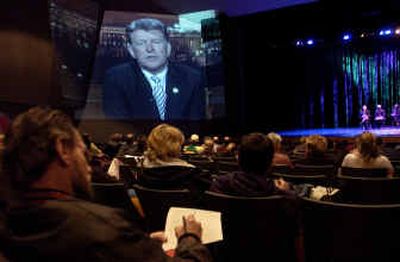Pair debate Patriot Act powers

Portions of the controversial Patriot Act are set to expire next year, but debate over the act and its implications are far from finished.
One of the act’s chief critics, U.S. Rep. Butch Otter, R-Idaho, spoke to an audience at North Idaho College from a video address projected onto the two-story wall of Boswell Auditorium on Monday, in the opening act for this spring’s Popcorn Forum. This year’s theme is “Hot Talk: Passionate Debate for A New Age.”
“As Americans, it is fundamentally our belief that each of us is responsible for safeguarding our personal freedoms,” Otter’s larger-than-life image said. “It is our obligation, our duty to see that no one is allowed to take them away, not even our own government. … It is equally important that we jealously guard our freedoms from being chipped away piece by piece before our eyes.”
Otter was not present for the forum, but his Idaho counterpart in the Patriot Act debate was – U.S. Attorney Thomas E. Moss.
The Patriot Act was passed 46 days after the Sept. 11, 2001, terrorist attacks on the World Trade Center and Pentagon. Moss had been appointed U.S. attorney for the District of Idaho less than a month before the attacks. Otter emerged as one of the few congressmen to vote against the act and has continued to campaign for changes and outright elimination of many of the act’s provisions while the administration seeks its expansion.
Otter is concerned that the expanded powers in the act could be abused and used against ordinary American citizens, not against terrorists.
He is particularly concerned with the “sneak and peek” provision of the law, which allows for searches with delayed notification of property owners; with “roving” wire taps that can apply to multiple phones and potentially multiple people; and the expanded use of the law that makes it easier for the government to seize the records of businesses and libraries.
He is re-introducing a bill called the Security and Freedom Ensured Act, or SAFE Act, that he said would rein in some of the most egregious elements of the Patriot Act and submit others to the act’s June 1, 2006, sunset clause.
Moss, however, painted the act as one measure that’s helped safeguard the country from new terrorist attacks.
“Disruption is the goal,” Moss said. “Information is the key.”
Paraphrasing President Bush, Moss said it’s no longer good enough that law enforcement catch criminals after the fact. In the post-Sept. 11 world, terrorist crimes have to be prevented – not just prosecuted, he said.
“The world has changed, and so must the law,” he said. Since the Patriot Act went into effect more than three years ago, no one has taken advantage of a provision in the law that allows citizens who believe their rights have been violated under the law to file suit against the government, he said.
“The Patriot Act does not overreach,” he said. The presentations by Moss and Otter were followed later by a panel discussion in the NIC student union building.
The Popcorn Forum continues today with two different panels on the press. First, at 10:30 a.m., legal experts James M. Vache and Gary Maehara will give their interpretations of the First Amendment and its application to a free press in a presentation called “Free Speech and Press vs. Censorship.”
At 11:30 a.m., editors of The Spokesman-Review and The Coeur d’Alene Press, along with a University of Idaho media professor and spokesman for the Kootenai County Sheriff’s Department, will discuss media responsibility and whether the press has an obligation to withhold certain kinds of information. The panel discussion will mediated by the Idaho Press Club.
On Wednesday, the Popcorn Forum continues with the topic of same-sex marriage, in a 9 a.m. discussion between Praveen Fernandes, a public policy advocate with the Human Rights Campaign in Washington, D.C., and Dwight G. Duncan, a professor at the Southern New England School of Law.
Thursday’s topic is “The Right to Privacy vs. the Public’s Right to Know” at 9 a.m., featuring Jack Van Valkenburgh of the Idaho chapter of the American Civil Liberties Union and Jeff Jacoby, a conservative columnist for The Boston Globe.
Friday will feature a video presentation by U.S. Sen. Larry Craig, R-Idaho, on the Second Amendment and gun ownership, at 11 a.m., followed by a presentation on “Violence and Technology in the 20th and 21st Centuries” by Marilyn Levine, a professor of social services at Lewis-Clark State College, at 11:30 a.m.
All presentations are in Boswell Hall followed by afternoon panel discussions at 1 p.m. in the Lake Coeur d’Alene Room of the Edminster Student Union building.